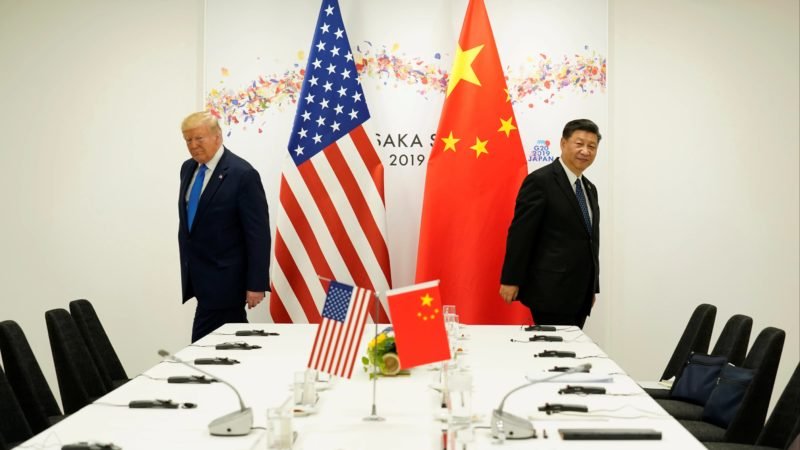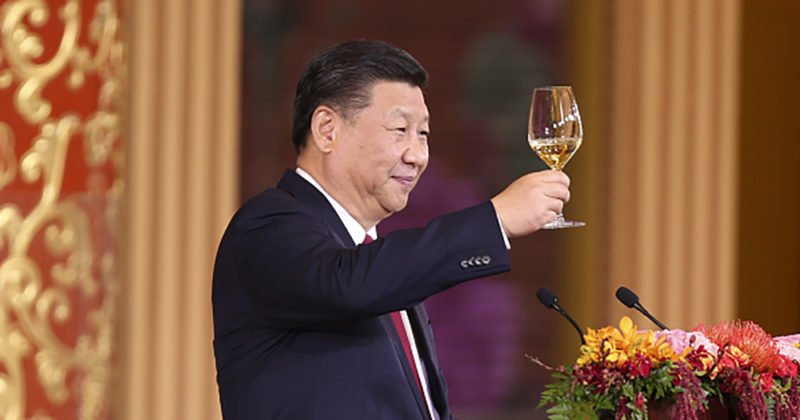Great Powers: Binary Dynamics

China’s Strategic Maneuvering across Line of Actual Control subsequent to Pangong Tso standoff brought huge embarrassment for Indian Prime Minister, relegating India’s position from predominant strategic points, which earlier leveraged India’s position against Chinese in high altitudes. The belligerent attitude of China is arguably a well-articulated and methodological response to the uncertainties in International order emerged after COVID-19. Synchronized progression of events escalating tension with countries around China, appears to be part of new active and aggressive foreign policy to press any criticism to the edge. An aggressive push to nine-dash line demarcation in the South China Sea has irritated Vietnam, Taiwan, Philippines, Indonesia Brunei and Malaysia and furthermore. All these countries are contesting with hegemonic China over Paracel island in north, Spratly island in the south and Scarborough Shoal island in the east.
The confrontation over shallow waters implicitly defines the magnitude of relative power involving great powers and emerging powers, and ambition to control navigation in the region and high seas. The importance of south China sea can be traced by the fact that it holds 50% of global oil shipment, which is three times to that of Suez Canal and five times to that of Panama Canal, hence any short of miscalculated Militarization of the sea engender fluctuant situation over global supply chain ex post facto leaving net security of the region in jeopardy. Immediate objective to control these island is newly discovered hydrocarbons and well known pre-existing living marine resources that support half a billion population persisting near the coast of South China Sea under fierce economic competition, pronunciamento ‘Asian industrial revolution’.
PLA’s Warplanes violating the sovereignty of neighbouring states, encroaching on airspace all over the region necessitated for the presence of an effective deterrence once again. Dragon’s ultimate fireball is its hard cash that is used to engage small economies to not just fund projects but also installing its technological and human agency gulping up financial and territorial sovereignty, advantaged to Chinese global strategic vision and financial domination; Sri Lanka, Djibouti, Maldives, Pakistan are examples and more to name. China has articulated sward and olive strategy to consolidate its position in Global power politics allowing it to have a maximum number of variable elements corresponding to historical records and narratives instigating relative power struggle and capabilities.
In this piece, I’m going to analyze how the Chinese managed to dominate the region and transpire up-front with democracies, at least in material superiority. Was china always a dominating (major) power or is it a recent phenomenon? What caused the USA to act in a manner to resurrect primordial equation; do understanding of power balance among great powers rammed between vulnerability and sensitivity to any relative change?

Cogito ergo sum: China’s rise (potential malice to the USA)
Americans idealized china as a free democracy and as their strong ally in Indo-pacific after victory in WWII; visualization of democratic China decomposed instantly after People’s Republic of China (PRC) chased away US-backed Republic of China (ROC) to the island of Formosa (Taiwan) ending up with Non-recognition of PRC by Truman administration. PRC considered the USA as serious threat concluding Sino-soviet treaty of friendship and alliance on Valentine day of 1950. At that instance, there was no distinction among communist states because of the relative position of states (especially communist states) were static for two decades to come after WWII. The US perception of Chinese threat was grounded over certus Sino-Soviet cooperation in the Korean War and Vietnamese War, exacerbated to truncated agony following Chinese Detonation of their first nuclear bomb in 1964. The US came to realize promptus change that has already occurred in relative capabilities along with domestic and organizational elements.
Assessment of relative power and actual scrutiny of new evolving eastern gravitas was conducted by western pole particularly the USA, through numerous engagement in South-east Asia and East Asia. After tiresome effort to malign communists influence in the region, Westerners might got over the conclusion to offer a piece of cake to a hostile state before it gets too tough to influence. Changing capabilities of Asian powers helped US policymakers to purview unconventional interest and opportunities to achieve a new goal, meanwhile, two communist mammoth enfrentado seven-month undeclared military standoff in 1969 near Manchuria rendered US opportunity to adventure new area in Asia by mooting Good communist and Bad Communist; offering a hand to good communist (China) in a desperate attempt to counter-fire soviets.
Conservative Nixon applied liberal approach in contemplating Chinese anxiety in order to reduce soviet’s coercion on various fronts. Nixon exhibited big heart for china by establishing diplomatic ties after two decades. Nixon played an upper hand in domestic politics by fixing up so-called Truman’s mistake.

The genesis of New dimension
“There is no place on this small planet for a billion of its potentially most able people to live in angry isolation.” Richard Nixon, after his election in 1968, arguably euphuistical on part of the foreign policy of US, quite significant for interior affairs. Nixon tried to apply a mixed range of medicine to the common communist problem, out of which most successful happened to be an economic tool. Triumphant Kissinger doctrine in Latin America gave it heavyweight to be observed in soviet-China equation. The idea of improving relation with Moscow advances through Peking, was well known to Kissinger and Nixon, so a secret visit for US national security adviser was to be arranged, only through the third party. Pakistan was picked over Romania to mediate into the new beginning. Pakistan had the advantage of being a friend of both sides, escaping any danger of Russian involvement in the process. There was a public announcement for Kissinger’s trip to India, Pakistan, Vietnam and Thailand, but china was deliberately kept secret to dodge civil exasperation. The secret visit was accompanied by body double Reedy and McLeod to Puzzle Pakistani media for Kissinger and Winton Lord, both were secret service agent.
Amidst Americans effort Chinese didn’t want to play tough and they appeared like they already planned to invite Nixon. The result of secret negotiations were finalized with Nixon visit to China in February 1972 which was very well organized and calligraphically well decorated. A communique was exchanged and agreed upon both sides without the participation of secretary of state in any of important meetings. Secretary of State William P Rogers saw the communique and resented “that is no way to do business,” and called this as a disaster particularly on Taiwan issue. Nixon doubted about a positive outcome from the visit, but this visit literally changed the dynamics of world politics. There was a certain degree of principle rift between Nixon and Rogers over domestic outrage over the latest development happened in Shanghai. American civilian’s perspective of China was about to transform- equalized with open trade and business to the Taiwan gamble. The success of newly established bilateral relation can be investigated by the fact that every president of the United States after Nixon paid a visit to China except Jimmy Carter.
The question of the one-China policy was put on the backburner- contrary to earlier standpoint, and new political status of Taiwan was drawn up in 1979 subsequent to the establishment of US-China diplomatic relation under Carter administration, which recognized the People’s Republic of China as the sole legitimate government of China. Taiwan Relations Act, 1979 passed in United States congress down-pouring ROC’s claim together with democratic visual of china. However, the USA maintained non-diplomatic relations with Taiwan and encouraged its people to maintain cultural and commercial ties under the new arrangement. The US announced to withdrew military installation from Taiwan and demilitarize Taiwan Strait leaving strategic democratic movement under tragic jeopardy. This manoeuvre favoured China, clearing off the whole South China Sea for Chinese dominance withdrawing its status of ‘net security provider’ to ‘net adversary provider’.
Ignoring Chinese enormity in the region for a decade, US gave china carte blanche to dominate the South China Sea until recent. W. Cohen holds view-“Perceptions of the ‘China threat’ centre on the growing capacity of its government to disrupt the existing international order. Militarily, it is acquiring the means to project power outside East Asia and to challenge the U.S. Navy in the Western Pacific, specifically in the vicinity of Taiwan.” The premise of the statement acknowledges recent events and trade war between both counties endorsing United States fear of losing blue waters superpower status to the hand of the Chinese Navy. Recently Trump administration smelling Chinese threat, initiated intelligence-gathering activities by sending reconnaissance flights and warship in the South China Sea to ensure free navigation, in addition with weaponizing its currency in form of sanctions to alter Chinese behaviour. Any miscalculation may result in severe escalation.

From interdependence to intensified dependence over china
The most popular phrase of the Cold War was ‘National security’ which was repeatedly used to justify alliances, cooperation and extensive military involvement. Internationalism and globalization were promoted on the name of national security interest viz. capitalist against communist. Détente in US-Soviet political deadlock provided a rationale for the evolution of a new era of interdependence. Reconciliation of US and China relation was a supplementary advantage to the world peace that opened people to people interaction to sustain this new relation.
Opening up of the Chinese market for world investment in 1979 laid the foundation of the socialist market economy leading to de-collectivization of agriculture and business reforms. Formerly, poor China doubled its GDP in every eight years on average lifting out 800 million people out of poverty according to congressional research of the US by 2017. World Bank estimated the end of absolute poverty from china by 2020. In these pleasing 40 years, China has been able to reclaim the 17th-century position of having glorified economy and largest manufacturer having a share in manufacturing output of around 28 percent of all global output in 2018. China’s economic miracle was driven by foreign direct investment in initial days of liberalization in limited cities, but soon production in industries created wealth to finance the projects in hinterland leading to growing domestic consumption which is a new growth driver for China
Kissinger convincingly argued the security of nations and balance of power among major powers no longer defines US’S perils or Possibilities alone, because of the emergence of a new era –“old international patterns are crumbling; old slogans are uninstructive; old solutions are unavailing. The world has become more interdependent in economics, in communication, in human aspirations.” It was the time when the potential of interdependence observed in trade and commerce along with social transaction and increasing technological capabilities other than conventional interdependence among Militaries. A most important feature of new interaction was its merit to sustain in an adverse scenario, even among ideologically different societies as it happened with the US and China but failed in case of US and Soviet.
China’s role in integrating world economies is phenomenal in the sense that it accounts for up to 28 percent of export in electronic, equipment and machinery sector. Today world is dependent over china for a range of high-end items required cutting edge technology, like electronics, pharmaceuticals, Rare earth metals and few to name, literally making world dependent over Chinese domestic supply chain. According to Mckinsey Global Institute report published in July 2019, China’s technology value chain is globally integrated, for instance, China accounts for 40 percent of global mobile phone sales in 2017, 64 percent in electric battery vehicle sale and 46 percent of semiconductor consumption. MSCI report suggests, US’s information technology industry earned 14 percent of their revenue by having access to the Chinese market. There is no other place on earth for such competitive manufacturing which led China to take over the world easily.
Recently Chinese President Xi Jinping pushed for ‘Made in China 2025’ (inspired from Germany’s ‘industry 4.0’) industrial plan integrating indigenous technological innovation and manufacturing on a common trajectory, prioritizing 10 sectors ranging from the aerospace industry to biopharmaceutical sector. This technological renaissance in Big Data, artificial intelligence is key for global dominance in the next era. Meanwhile, the US Department of justice blamed Chinese involvement of 67 percent of trade secret theft causing loss of 320 billion US dollars annually. Industrial espionage was the most popular theft episode during world war two and it continued during the cold war between the US and Soviets. According to the Department of Justice, “China has cultivated large rank of cybersecurity talent by sponsoring teams in international competition, feeding acquire knowledge of international cyber vulnerabilities into National database….. These attacks offer strong incentives to Chinese intelligence to continue its industrial espionage.”
Cost of dependence over China evident from fact that China has a trade surplus of more than 420 billion dollars in 2019 with all countries it trades with, seems high enough to payback by global communities; any new adjustment to alter environment have potential to sensitize vulnerability to some extraneous action that may spiral up leading to war.

Is there any escape route from Thucydides trap?
Napoleon once warned- China is sleeping Lion, “Let her sleep; for when she wakes she will shake the world.” The big picture is ‘china has risen and China is rising more’ and it already started to impact the US and the global order of which the USA is architect and protectorate. Do Thucydides dynamics suggest war is inevitable? Do Great power dynamics only settle after the war?
Obama summarized work of his predecessor before he left the office calling China, ‘a strategic partner’ (the second-highest relationship between nations after ally) which is now designated as ‘Strategic adversary’ by the present administration is just a reflection of Great power adjustment dilemma. Graham Allison’s account on Great power dynamics suggests the leadership of rising power always understands the complexity in building a new form of a great power relationship, while established great power do not want to lose its sole status or share part of it to the rising power viz. ruling power syndrome.
The Atlantic Charter provided the vision of ‘One World’ global order, to be operated together to provide collective security, more precisely US-led global order. Roosevelt anticipated much more compromise than any other leaders to equate sovereignty among great and middle powers. Since then great power relations institutionalized on liberal internationalism agenda which was pushed aggressively by Nixon and Carter. Status of many underdogs demanded an update. ‘National security’ term which dominated cold war era concerned military power declined and its spillover effect traversed through the economy and cultural invasion. Tectonic of power started to shift as GDP has shifted, of course, military dimension wasn’t out of Table. China was among leading underdog and its rise threatening US hegemony resembles ‘rise of Athens’ that installed ‘fear among Spartans’ which ruled Greece for Hundreds of years, making war inevitable prompting both states to return to ashes in the history of Greece.
Allison writes in his book ‘destined for war’ that, “there are 12 instances out of 16 when rising power threatened ruling power in the last 500 years and ended in war.” Four settled peacefully or with the lowest level of violence. He suggests, the US aversion of China in the expression of MARX is quite subjective in terms of emotion and Psychology before power politics and material dynamics. He suggests the Rejuvenation of China is not to displace the USA from its position at least in military terms but it is the noble, reasonable and understandable aspiration to reduce relative poverty and create more wealth for its people. The discomfort of the US comes from their psychical hunch of being accustomed to being at the top on every sphere. The combination of subjective components often led to misperception and miscalculation.
Escaping Thucydides trap is a compromise by both party i.e. not to indulge in conflict due to third party vulnerability either in the South China Sea, or Taiwan or North Korea. Allison and Qui Yuanping agrees over the escape from Thucydides trap by exercising preparedness for any kind of crisis and actively establishing a line of communication on every front to minimize misreading of the situation. Both parties can be partner and rival at the same time. The complicated competitive relationship needed to be established and sustained to reduce any kind of escalation. In such situation cooperation will lead to a win-win scenario and hostilities may lead to global catastrophe.
Fukuyama’s ‘the end of history’ often interpreted as there is a limited chance for great powers to engage with each other in security competition. The statement is contrary to the existence of sole power (United State of America) trying to maintain its hegemonic control by maintaining thousands of troops in Europe and North-east Asia because it recognized the emergence of rival major power if withdrawn; hence history has not ended. No scholar of the day can deny, China has not emerged as a major power. China was never been lesser power, its sheer size and enormous resources always favoured her on the negotiation table. Power does not recognize the status quo in the international system, there is always the existence of revisionist determinism. The only question that matter is: does the rise of China favours global peace and security? The answer depends on how existing powers (great, middle and emerging all together) sees the new percept threat emerging out of Chinese behaviour.
International regimes are still interdependent despite uncountable hostilities, there is still space for a political bargain. International organizations still acting in order to strengthen the structures and rule-based international order that facilitates interdependence. China has just seized the opportunity (which was vacant earlier) after it gained necessary capacity; this is what every emerging power do, ‘Fill up the vacant space’.


















